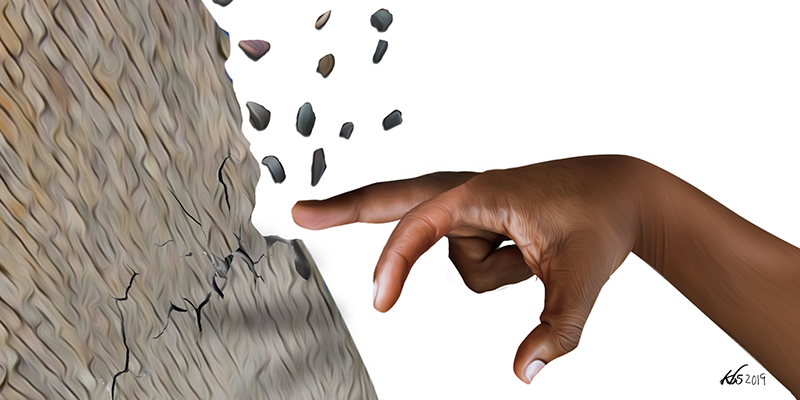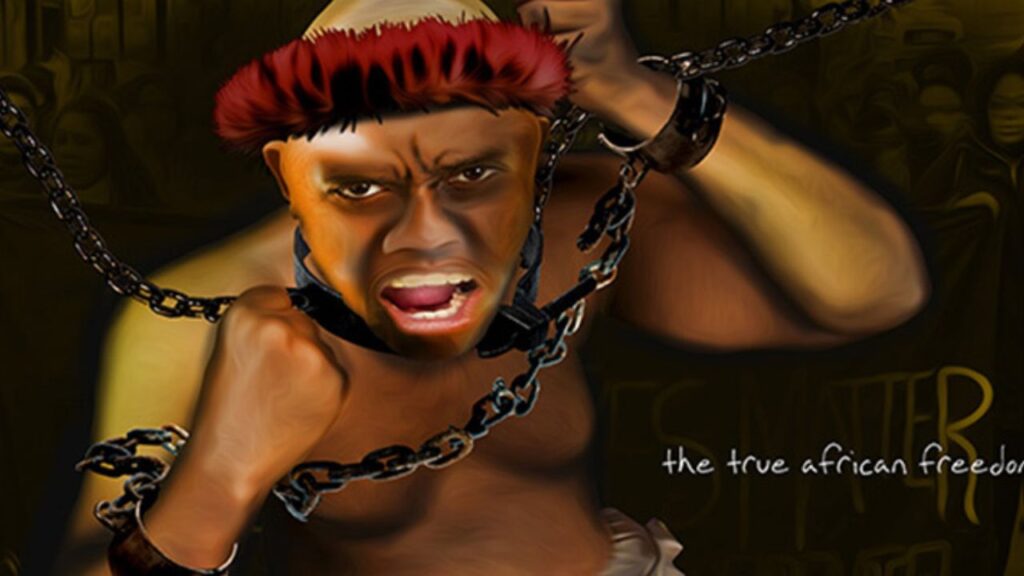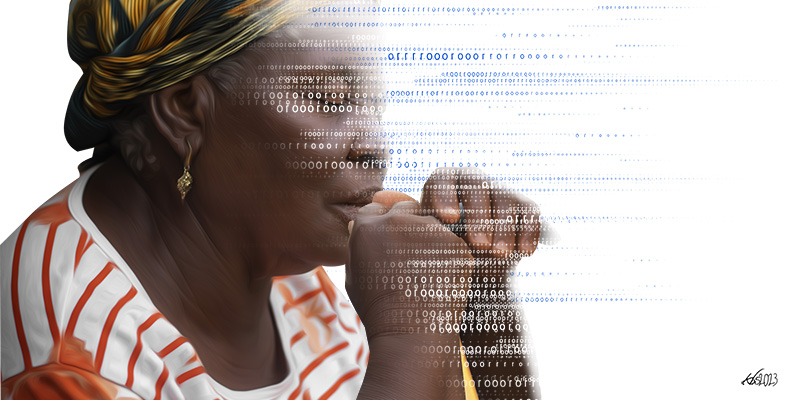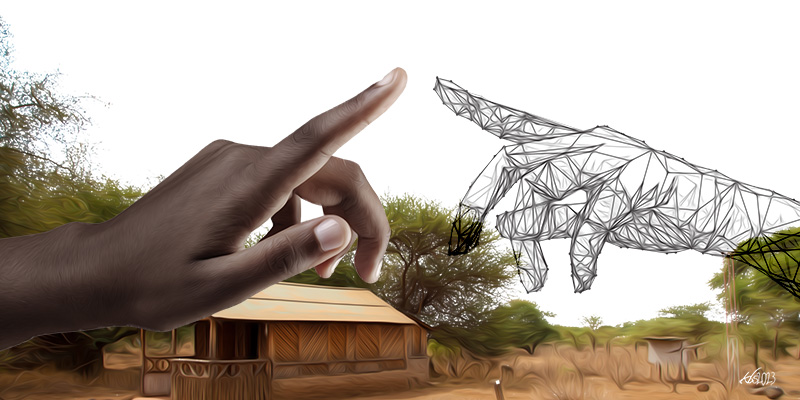“Bukhosi is missing. BHUKOSI IS MISSING. Bukhosi is missing.”
These stabbing words are from Zimbabwean writer Novuyo Rosa Tshuma’s book House of Stone. The words are written firstly in italics for emphasis, then repeated boldly in capital letters to let them hit you like a sledgehammer, and then repeated again so the text slowly seeps into and clings to mind. After that, every page I open of the book, my mind begins by reading this text into every page – BHUKOSI IS MISSING.
Taken together in one thought, these words deliberately disrupt the grandiose unstable, if not simmering, surface of Zimbabwe’s slippery nation-state construction project, which is acutely unravelling. Africa’s post-colonial nation-state construction projects have often collapsed with catastrophic impact. To understand how this possibility of collapse is playing out in contemporary Zimbabwe, one has to read these words by Novuyo Tshuma over and over again because in a bold way it lays bare the torturous trajectory of Zimbabwe’s post-colonial failures or helps us to ask the question “What happened?”, as posed by the Ethiopian writer, Dinaw Mengestu in a review of House of Stone published in the New York Times on March 8, 2019.
But Novuyo Tshuma’s House of Stone does much more because the writer’s words profoundly conjure the complex and ever unwinding threads of a liberation project gone wrong: continued state brutality, disappeared dreams, mass emigration, missing bodies, torture and state impunity, the trauma of doubted belonging and citizenship, the unrested ghosts of spirits packed into unmarked graves, and the lingering quests for human dignity and justice that are now stretching to secession. Because of its commitment to subversion, to counter-hegemonic narratives, the book has no local publisher in Zimbabwe.
But for now let us turn to the ways in which Zimbabwe’s political class has been gripped by the ghosts of the coup of November 2017 that carted off long-time leader Robert Gabriel Mugabe.
Currency battles
In an abrupt and highly unexpected policy move, the Minister of Finance in Zimbabwe, Professor Mthuli Ncube, announced that Zimbabwe’s multi-currency regime was over and stated that going forward, all domestic transactions must be carried out in the local currency – the Zimbabwe Dollar ($ZWL). Through the Reserve Bank of Zimbabwe (RBZ), the minister issued Statutory Instrument 142 of 2019 (SI 142/2019), which stated that “with effect from 24th June 2019, the British pound, United States dollar, South African rand, Botswana pula and any other foreign currency whatsoever shall no longer be the legal tender alongside the Zimbabwe dollar in any transactions in Zimbabwe”.
SI 142/2019 has been buttressed by other measures by the RBZ, including the hiking of interest rates to a whopping 50 per cent in an economy where the government has been the largest borrower. The Minister of Finance’s policy was supported by the President of Zimbabwe, who stated the following:
It has always been clear that for our economy to truly take off, we need our own currency. While the multicurrency regime helped to stabilise the economy, it did not give us full control monetary policy and left us at the mercy of the US Dollar pricing which has been the root cause of inflation…As a result, yesterday we passed a Statutory Instrument to abolish the use of multiple currencies, and make the Zimbabwe dollar the sole legal tender with immediate effect (President Emerson Mnangagwa, 25th of June 2019)
SI 142/2019 effectively re-introduced the Zimbabwe Dollar ($ZWL), taking Zimbabwe back to the dreaded days of hyperinflation, last measured in November 2008 when it was at 89.7 sextillion per cent. At the height of that madness, the Central Bank turned the printing press up and went to issue the largest ever recorded denomination of $ZWL: 100,000,000,000,000.
In an abrupt and highly unexpected policy move, the Minister of Finance in Zimbabwe, Professor Mthuli Ncube, announced that Zimbabwe’s multi-currency regime was over and stated that going forward, all domestic transactions must be carried out in the local currency – the Zimbabwe Dollar ($ZWL).
The contradiction that was lost in this statement by the president was that the people of Zimbabwe and businesses are actually worried sick if the ruling military-nationalist class take “full control of monetary policy” and the Zimbabwe dollar becomes the “sole legal tender”. This zig-zags of monetary policy are evidence of a currency war currently raging. On the one hand, the citizen, local businesses and investors would rather store their money and do business in stable foreign currencies, while on the other hand, the government would prefer a local currency that it can easily manipulate.
These “currency battles” betray a larger complex political-economic contest at play in Zimbabwe. First, the country’s political landscape, which remains largely polarised. Second, an agrarian political economy, which collapsed, wiping off over 35 per cent of GDP. Third, the ruling party’s authoritarian rule, which puts the military and the security class at the centre of political and electoral contests. Fourth, an economy that has virtually become a South African supermarket. But beyond these structural impediments in the political economy is the way the political and military elites have captured and raided the national treasury as often as they want, which has forced the Minister of Finance to admit that he will have to issue a supplementary budget.
The President and the Minister of Finance have been very quick to boast about “month to month surpluses” since they started implementing what they have called the Transitional Stabilisation Plan (TSP). The political class has ignored that the surplus has no relation to productivity in the economy; rather, it is linked to a 2 per cent tax, a fuel duty and a directive where car importers have to pay duty and customs in foreign currency. Importantly, they do not consider the catastrophic cost of austerity or “shock economic therapy” without social protection. The policy experiments under “Austerity for Prosperity” have taken their toll on the ordinary citizen. Tendai Biti, a former Minister of Finance and Vice President of the opposition, has argued that the current political elites are committing “a slow genocide”. There is a case for such a horror summation.
Firstly, social services like health have collapsed; medical staff are routinely on strikes and politicians, including the Vice President, are routinely chartering flights to India or South Africa for medical attention. Secondly, the morbidity rate from non-communicable diseases is running riot as the cost of health is now beyond the reach of many. Thirdly, in the education sector, the drop-out and failing rates are so high that a former Deputy Minister from the ruling party charged his fellow elites with “killing a generation”. Furthermore, the country is currently experiencing extreme load shedding under which Zimbabwe has no power for up to 19 hours a day. The lack of power is a systemic issue that points to the collapse of planning, especially in the Ministry of Energy and Power and more especially in the power company that has been stripped by successive waves of senior managers and board members. And those who plan to leave Zimbabwe, like the mass exodus in the early 2000s, have to wait for a long time. The passport office can only print “5 to 10 passports a day” and some citizens are being asked to come back in 2021 (Business Day, 30 June 2019).
The ghosts of hyperinflation
Anyone going through the e-commerce platforms of E-bay, Amazon and other websites can buy the Zimbabwe Dollar Bills for a price. Some of these dollar bills have denominations that are just dizzying. On E-Bay a seller in Australia is selling a bundle of 10, 20, 50 and 100 trillion dollar denominations of the Zimbabwe Dollar (that’s $ZWL10 trillion, 20 trillion, 50 trillion and 100 trillion, respectively).
People’s savings, investments and pensions have been wiped off to almost no value. When the local currency was printed by the RBZ and inflation shot to quintillion levels, an estimated US$5billion of pensions were wiped off. In 2016, when the government introduced another surrogate currency called Bond Notes, pensions that had been saved were also lost and the government routinely raided foreign currency accounts at will. With this latest announcement, savings and pensions are also getting wiped off as inflation erodes value.
Moreover, the stability of the currency is in doubt simply because for close to two decades the political elites have used the RBZ as a looting apparatus and they have grown accustomed to periodically dipping their fingers in it. At the heart of Zimbabwe’s currency crisis is a rogue political system that has used the Central Bank and the Reserve Bank of Zimbabwe as looting vehicles to reward patronage. The political elites have been relying on an authoritarian system of rule that can simply order the printing of money with impunity and disregard economic fundamentals.
People’s savings, investments and pensions have been wiped off to almost no value. When the local currency was printed by the RBZ and inflation shot to quintillion levels, an estimated US$5billion of pensions were wiped off.
Under Robert Mugabe, especially under the RBZ Governor Gideon Gono, inflation became unbearable and the ordinary citizens started using foreign currencies to transact. Slowly citizens are going back to storing their money in foreign currencies – money has become a commodity to be bought, stored and sold for itself without ay relationship to production. Zimbabwe is now a speculator’s paradise and each night the proceeds of the arbitration find themselves in the vaults of the political class. A minister of the government recently had a worker who fled from her house with about U$25,000 in cash.
Glowing rhetoric, grand corruption and no reforms
When the current President took over, he began an intensively orchestrated, some say British- based, serious social media blitz on Facebook and Twitter. The intention was to counter the dominance of government critics on online platforms but also to present the new President in a different light, especially considering his controversial role in Zimbabwe’s dreaded security apparatus, corruption in diamond fields in the DRC and his involvement in the collapsed ZANU PF state companies.
At the heart of Zimbabwe’s currency crisis is a rogue political system that has used the Central Bank and the Reserve Bank of Zimbabwe as looting vehicles to reward patronage.
But critics have been quick to correctly point out the glaring disconnect between what social media handles say and what is actual government policy on the ground. It was recently disclosed that the government has signed on two lobby firms in the US to convince the US Congress to remove Zimbabwe from a targeted sanctions list so that the country can access funding from multilateral financial institutions like the International Monetary Fund and the World Bank. The US government has been able to see through this rhetoric of talking reforms and continuing on a clampdown, including ongoing arrests of civil activists for “treason”.
To fully comprehend how the political class in Zimbabwe is affecting a grand heist of public resources, one just has to focus on two institutions: the RBZ and the Ministry of Finance. Through the RBZ, the political elites, the military who’s who and government managers have been administering a very opaque system of “foreign currency allocation” often to their cronies, especially in the fuel sector. The fuel industry in Zimbabwe has fallen under the control of business elites directly linked and deeply networked either to the military or to ruling party officials such that the government has refused to liberalise the sector. A glaring example is the cartel run through Green Fuel, which is has a legally protected monopoly of selling ethanol in the market. (The businessman who owns Green Fuel is linked to the President. Here are the words of a “government advisor”:
The result is that we have spent probably US$2 billion in secret premiums on the purchase of fuel on the world market. Much of it banked externally. So while our neighbours had fuel at world market rates, we paid a premium. Fine while fuel prices on world market were at historically low prices from 2014 onwards. But the result is that we spend over US$100 million a month on bulk fuel supplies when the actual cost today should be about US$70 million (Eddie Cross, May 2019)
In a recent press statement, the ruling party’s Youth League paraded a list of “corrupt” government officials, including an ally of the President, the RBZ Governor and the party’s powerful Secretary of Administration. The accused simply dismissed the statement as a side show, and the President announced yet another Commission of Inquiry. The President proceeded to appoint the wife of the Minister of Foreign Affairs as the Chair of the Zimbabwe Anti-Corruption Commission (ZACC) and the new commission includes a “retired” army senior officer. But there is also a rift running much deeper that points to lack of cohesion among the political elite and a competition “to eat” within the ruling party networks. Here are the words of a former student radical leader now turned into a political class praise singer:
We have normalised corruption and regard it as par for the course. Provincial lands officers run around like fief lords, dishing out offer letters for land in exchange for cars and private school fees, and nothing gets said. We take pride, including headlines even, that we have managed to suspend some VID officers in some nondescript town for taking bribes in exchange for licences and no-one stops to say: really? Like that is why we have been robbed blind on infrastructure tenders and sales of diamonds and such? (Tinomudaishe Chinyoka, Nehanda Radio, 2019)
In a country in which the economy has come to a standstill, business is now highly speculative and trading in favours and arbitrage have become the mainstay of the elites. This is bound to create an explosive factional war to get access to state largesse. A Member of Parliament seen as an ally of the President recently boasted that he has imported a Lamborghini at a whopping US$410,000. It was recently revealed before a Parliamentary Committee that the Ministry of Finance cannot account for about US$3billon disbursed for the Command Agriculture programme, which was run by the military and the current President in the two years preceding the coup of November 2017. This makes it possible that the taxpayer actually funded the coup of November 2017.
Every year the Auditor General diligently produces reports on copious amounts of irregular expenditures, outright fraud, related party contacts, and outsourced services. In the latest report of 2018, there are references to huge amounts siphoned for political gain and debts incurred to feed the rentier class. There is the Zimbabwe Anti-Corruption Commission (ZACC), the President established a Special Anti-Corruption Commission, the Chief Justice recently opened Anti-Corruption Courts and yet there are no cases of elites getting investigated, fired, and or convicted. This is a weaponised smoke and mirror game to settle factional political wars.
The crisis of militarism
In a previous opinion article, I argued that Zimbabwe’s political system is now domineered by a typical comprador class that took power forcefully on the 17th of November 2017 and this “military-nationalist class” is now in total command of state power, party structures and by implication the shambles of what remains of the economy. At the apex of Zimbabwe’s political system now sits an anti-democratic, anti-reform looting machinery composed of a powerful network of military-nationalists who are not answerable to the governed but to their own rabid accumulation whims.
The nationalist liberation movement in Zimbabwe had previously operated comfortably under a very thinly veiled authoritarianism in which “politics commanded the gun”. But the coup of the November Days in 2017 opened the floodgates for “politics that is commanded by the gun”.
However, the crisis of militarism is not only in Zimbabwe. In Sudan, the military has stepped in to protect its interests. The same has happened in Algeria, Egypt, Malawi and recently in Ethiopia. The army in politics is now the proverbial elephant in the room with the military commanders routinely commenting on political issues in a country which is not at war. The youthful and rejuvenated MDC Alliance has been talking tough, especially about political reforms that are needed in the country and this is deepening lines of potential conflict. In response, the security state apparatus has been parading robo-cop-like police uniforms to intimidate the citizens and the President has continued holding what he calls “political dialogue” that excludes the major opposition, rendering the dialogue a travesty.
The nationalist liberation movement in Zimbabwe had previously operated comfortably under a very thinly veiled authoritarianism in which “politics commanded the gun”. But the coup of the November Days in 2017 opened the floodgates for “politics that is commanded by the gun”.
***
In a recent comedy skit by Zimbabwe’s top all-female comedy team called Bus Stop TV, the cast members commonly known as Gonyeti and Maggie are engaged in a tussle in which Gonyeti is fuming that she must undo a scarf that has not brought anything to her. She engages furiously in “kududunura scarf”, which is an intelligent jibe directed at the President’s now-infamous scarf that he wears even in inappropriate weather.
Civil servants, even after two pay increases, have put the government on notice. Nurses, teachers, and banking employees have seen their incomes collapse to below US$50 a month. Pensioners are now living in penury as some of them earn an equivalent of about US$10 a month in a country which imports all the basics. With inflation estimated at 196 per cent, the country is heading for social strife. Economist Godfrey Kanyenze argued that the “Zimbabwe Dollar is dead on arrival”. The ruling class elites are engaging in open spats on social media. Factions are competing to get hold of the national treasury. The Commander of the Zimbabwe National Army (ZNA), which carried out the coup of November 2017, has been urging “soldiers to be patient”. This betrays the uneasiness within the ranks.
There is growing discontent across the country. The literary scene has been exploding too with a direct challenge aimed at displacing choreographed historical narratives of the nation, triggering debates on nation-state construction and opening up to scrutiny (perhaps justice?) the vagaries of violence and trying to re-imagine the country. Witness the books by an all-female cast: We need New Names (NoViolet Bulwayo), These Bones Will Rise Again (Panashe Chigumadzi) and House of Stone (Novuyo Rosa Tshuma).
The political class in Zimbabwe is drunk with power and eventually the game of chance they are playing will come to an end. Given enough chances to pull the trigger in a game of Russian roulette, the drunkard will eventually hit the mark. Such is the current situation in Zimbabwe.








